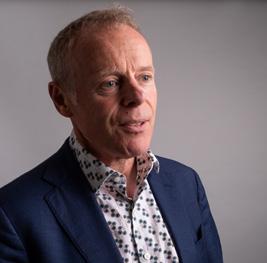
3 minute read
INTERVIEW: THE PAYMENTS ASSOCIATION
The Payments Association’s purpose is to empower the most influential community in payments, where connections, collaboration and learning shape an industry that works for all. We dig deeper with Director General, Tony Craddock

EME Outlook (EO): Could you talk us through The Payments Association – when was it founded and what was its initial vision?
Tony Craddock, Director General (TC): The association was founded in 2008 by myself and a small board of directors who identified that the payments industry was undertaking a period of rapid evolution and change. Back then, there wasn’t a network that could act as the catalyst for that growth, so we saw an opportunity to set up such a community that could support and serve the interests of companies across the entire breadth and depth of the payments industry.
We’ve since deployed a commercial community model that has a range of services to cater for the various needs of the community and as a result, we have built a very loyal and growing membership base.
We have also achieved a high level of engagement from our members and were recently recognised as the UK Association of the Year by the Association Excellence Awards 2022, which we’re really proud of.
EO: Do you think you’ve succeeded in delivering that initial vision?
TC: I think we’re just starting out really. We started off in a tiny room with a small group of people. We didn’t have a big pot of money to invest in this, and it’s been built organically using our own investment, hard work and creativity.
I believe there’s now a need to play an even greater role on several fronts to serve the interests of the payments industry. It’s an unusual sector because, unlike many markets, where you find yourself competing with other companies, for those in the payments industry, collaboration is a prerequisite for success. Today’s partner or competitor may be tomorrow’s supplier or customer. So everybody must get on with everyone else. We enable this collaboration by providing a range of different events, research projects, and industry engagement working groups, which make collaboration easy and efficient.
In payments, collaboration is not a project. It’s a lifestyle. With the economic downturn and the hangover from the pandemic ringing in our ears, we have to further improve how we influence industry institutions such as the regulators, the Treasury and central banks, to make sure that the foundations of our industry are rock solid.
We must also look to deepen the breadth of services we provide, particularly around training and development, and broaden them, by growing across the EU and in different regions of the world.
EO: What are some of the major challenges and developments the association is currently facing?

TC: One of the issues that keep our members up at night is that fraudsters and scammers are getting smarter, so we as an industry must get better at preventing them from scamming and exploiting consumers.

Secondly, we’ve got to incorporate new technologies into our blueprint for the future. For example, the Bank of England is running a proof of concept for a Central Bank Digital Currency (CBDC) wallet, which is really progressive and exactly the sort of new technology that we must encourage the industry to embrace.
Thirdly, our community must try to encourage the adoption of new innovations without unsettling the underlying financial system, while promoting the UK as a market-leading provider of the different components that make our industry work. And we need access to an informed and progressive government that is prepared to provide support for our sector, so we are in the process of encouraging and inspiring the current government ministries to promote and embrace the adoption of new technologies and proportionate, agile regulation.
Elsewhere, there is going to be greater pressure to consolidate because of the changing nature of funding in the industry. After a decade of major investments into FinTech and payments, there’s less money around right now, and the money that there is will be more carefully focused on short-term profit rather than longer-term growth. This means that some people’s cash runways will be shorter than they had expected, and they will therefore be looking to consolidate with others. Personally, I welcome this, as it means those companies that focused on revenue rather than profit, with all the risks attached to this approach, will be absorbed into others built on more robust foundations.




